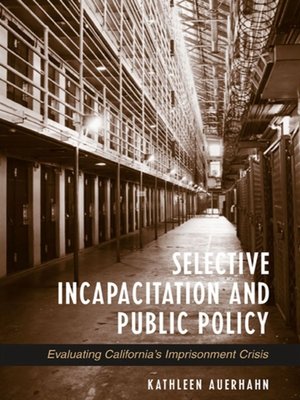Selective Incapacitation and Public Policy
ebook ∣ Evaluating California's Imprisonment Crisis · SUNY series in New Directions in Crime and Justice Studies
By Kathleen Auerhahn

Sign up to save your library
With an OverDrive account, you can save your favorite libraries for at-a-glance information about availability. Find out more about OverDrive accounts.
Find this title in Libby, the library reading app by OverDrive.



Search for a digital library with this title
Title found at these libraries:
| Library Name | Distance |
|---|---|
| Loading... |
Using cutting-edge methodologies, this book evaluates California's measures to protect the public from dangerous criminals.
From the 1970s to the new millennium, the prison population in the United States has quadrupled while an unprecedented amount of sentencing reform has taken place, largely intended to protect the public from dangerous criminals. This book details the California experience, including the history and politics of criminal sentencing policy reform, as well as the consequences of this activity to the criminal justice system. Using cutting-edge computer simulation modeling, Kathleen Auerhahn explores the impact that sentencing reforms dating back to the 1970s have had on the composition and structure of the criminal justice system, with specific focus on prison populations. She illustrates how dynamic systems simulation modeling is used to both examine "possible futures" under a variety of sentencing structures and sentencing policy alternatives, including narrowing "strike zones" and the early release of elderly offenders, in order to more effectively target the dangerous criminals these policies promise to remove from society via incarceration.







